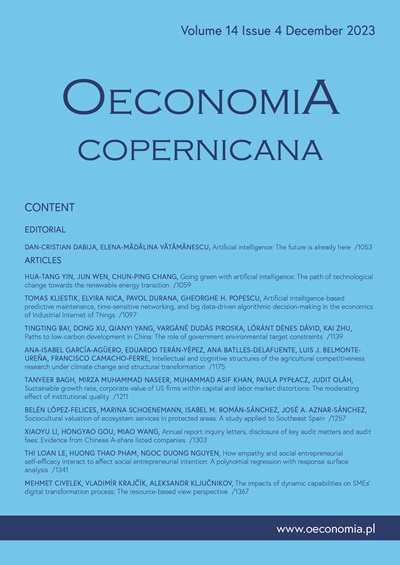Impact of corporate social responsibility on cost of debt in Scandinavian public companies
IF 10.8
1区 经济学
Q1 ECONOMICS
引用次数: 0
Abstract
Research background: In recent decades, companies have paid increasing attention to corporate social responsibility (CSR) and its related performance. Scandinavian countries lead the world in CSR and sustainability. The good CSR performance of Scandinavian companies has motivated studies on this phenomenon, particularly on the connection between a company's CSR and its performance. One of the most important performance indicators and value drivers is the cost of debt. Purpose of the article: This study assessed the impact of CSR on the cost of debt in Scandinavian public companies. Methods: The research was divided into two stages. In the first stage, Scandinavian public companies were divided into two groups (with and without ESG (environmental, social, governance) disclosure scores) to reveal differences in the cost of debt. In the second stage, a fixed-effects regression model for balanced panel data sets was applied from 2011 to 2020 to assess the impact of ESG and its pillars on the cost of debt. Findings & value added: The results revealed that the cost of debt of companies in Scandinavian countries with ESG disclosure scores was significantly lower. The ESG disclosure scores of these companies have increased significantly over the past 10 years. We found a positive impact of CSR on the cost of debt in Scandinavian public companies. The increase in ESG disclosure and pillar scores reduced the cost of debt. These findings are valuable from a scientific perspective. Scandinavian public companies with ESG scores have higher financial risk, but lower cost of debt. These results support the importance of investors' behavior, information asymmetry, and signaling. The findings have several implications for shareholders, managers and creditors. They suggest that creditors consider ESG disclosures when determining a borrower's creditworthiness. Additionally, it is a message to regulators that the debt market values ESG disclosures.企业社会责任对斯堪的纳维亚上市公司债务成本的影响
研究背景:近几十年来,企业越来越关注企业社会责任及其相关绩效。斯堪的纳维亚国家在企业社会责任和可持续发展方面处于世界领先地位。斯堪的纳维亚公司良好的企业社会责任表现促使人们对这一现象进行研究,特别是对公司企业社会责任与其绩效之间的联系的研究。债务成本是最重要的绩效指标和价值驱动因素之一。文章目的:本研究评估了社会责任对斯堪的纳维亚上市公司债务成本的影响。方法:本研究分为两个阶段。在第一阶段,斯堪的纳维亚上市公司被分为两组(有ESG(环境、社会、治理)披露分数和无ESG(环境)披露分数),以揭示债务成本的差异。在第二阶段,2011年至2020年应用了平衡面板数据集的固定效应回归模型,以评估ESG及其支柱对债务成本的影响。调查结果和附加值:结果显示,斯堪的纳维亚国家ESG披露得分较高的公司的债务成本明显较低。这些公司的ESG披露得分在过去10年中大幅上升。我们发现,社会责任对斯堪的纳维亚上市公司的债务成本有积极影响。ESG披露和支柱得分的增加降低了债务成本。从科学的角度来看,这些发现是有价值的。具有ESG评分的斯堪的纳维亚上市公司财务风险更高,但债务成本更低。这些结果支持了投资者行为、信息不对称和信号传导的重要性。调查结果对股东、管理人员和债权人有几点启示。他们建议债权人在确定借款人的信用度时考虑ESG披露。此外,这也是向监管机构发出的一个信息,即债务市场重视ESG披露。
本文章由计算机程序翻译,如有差异,请以英文原文为准。
求助全文
约1分钟内获得全文
求助全文
来源期刊

Oeconomia Copernicana
ECONOMICS-
CiteScore
13.70
自引率
5.90%
发文量
26
审稿时长
24 weeks
期刊介绍:
The Oeconomia Copernicana is an academic quarterly journal aimed at academicians, economic policymakers, and students studying finance, accounting, management, and economics. It publishes academic articles on contemporary issues in economics, finance, banking, accounting, and management from various research perspectives. The journal's mission is to publish advanced theoretical and empirical research that contributes to the development of these disciplines and has practical relevance. The journal encourages the use of various research methods, including falsification of conventional understanding, theory building through inductive or qualitative research, first empirical testing of theories, meta-analysis with theoretical implications, constructive replication, and a combination of qualitative, quantitative, field, laboratory, and meta-analytic approaches. While the journal prioritizes comprehensive manuscripts that include methodological-based theoretical and empirical research with implications for policymaking, it also welcomes submissions focused solely on theory or methodology.
 求助内容:
求助内容: 应助结果提醒方式:
应助结果提醒方式:


